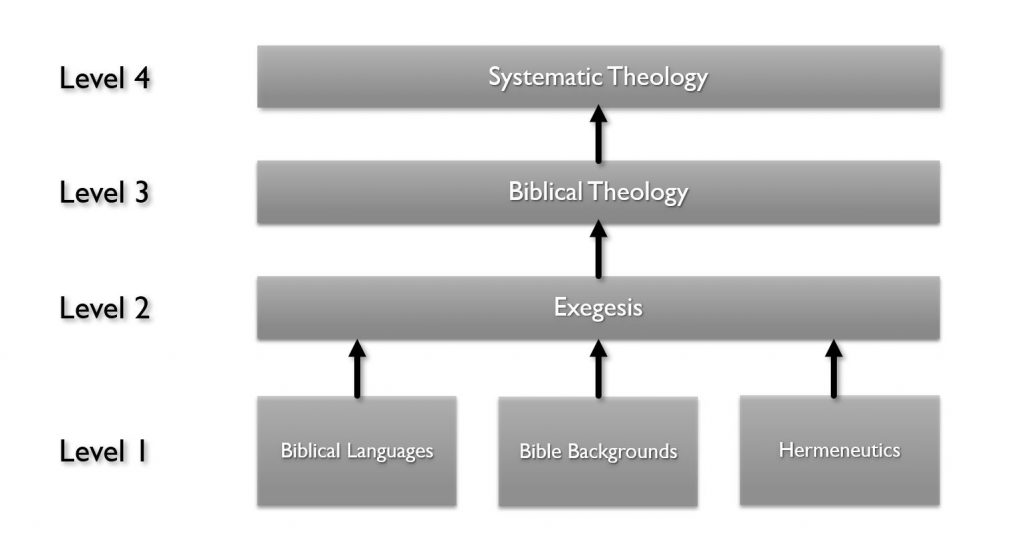Introduction
As a sequence of increasing levels of study, there are four tiers of learning development and theological understanding. For many decades, this model has existed to support a linear learning path for Bible students, pastors, theologians, and many in ministry. To serve as an outline and a general framework to learn each area of study. To be a resource to others and help the Church grow in the knowledge of Christ.
With this model of learning Biblical Studies, we move our way up as an approach to our advancement and more in-depth knowledge of theology. In contrast, we can arrive at correct conclusions without bad habits or wasted time. While we put effort and time into each subject area of interest, we expect to yield fruit or arrive at new levels to build upon.
These areas are segmented and partitioned to indicate what thinking and issues require our attention to defend or rely upon. To take a stand for the truth of God’s word, we need a structured method of understanding and study.
Foundations – Level 1
There is a hierarchy of subject matter relevant to topics of Biblical studies. Taken together, they are a group of subjects that serve as a foundation for further research concerning Scripture and associated issues. As a student advances further upward along with the four-level model, the supremacy of Scripture remains of utmost and pressing interest as it is the revered word of the LORD. This model is an ordered way of studying, understanding, and applying concepts and principles centered around God, His Church, His Word, and numerous additional doctrines.
Biblical Languages
Scripture is written in the languages of Greek, Hebrew, and Aramaic. From word definitions to grammar, punctuation, and phrases or sentences and their relationships to one another. The meaning of conjunctive terms gets close attention as well. The organization of paragraphs, chapters, and books are areas of interest and analysis.
The functional activity and operation of literary context rely upon the language in use throughout an entire book or genre. Theoretical components of constructed meaning, such as verbs, nouns, adverbs, and adjectives, have a significant role in the use of biblical languages.
Bible Backgrounds
Background details concerning culture, geography, mannerisms, etc. This area is the who, what, where, when, and why of Scripture. This concentration of study helps us to seek what was occurring at the time of events in Scripture. To recognize and study the purpose and rationale about why a book was written to coincide with proclaimed truth among their various authors. This is a support area of background for students to articulate what it is we believe and why. Examples include cultural factors, traditions, mannerisms, lifestyle, trade, transportation, vocation, law, military, heritage, tradition, and so forth.
Hermeneutics
These are the principles of studying Scripture. To recognize and understand theoretical hermeneutics or how and why we know the rules of Scripture. Or separately to follow theological hermeneutics in how we understand connections between the text of Scripture, their applications, and how we draw inferences. Sound hermeneutics then include word studies, paragraph studies, to affect an overall theological framework.
So hermeneutics pertains to how we study scripture to form theological principles. Without unfounded conclusions or errors by allegory, spiritualization, or logical fallacies while adhering to authorial intent by Scriptural genre.
Exegesis – Level 2
The application of the three disciplines of biblical languages, biblical backgrounds, and hermeneutics together contribute to the study and practice of exegesis. This is the study of grasping authorial intent within Scripture, where we see passages connect and allude to other passages. Connections that interface with Scripture can span vast areas of text. The scope of Scripture scales across themes and ideas that support one another in relevant and intentional ways between Old and New Testaments, or among covenants throughout history.
Biblical commentaries are often helpful with the practice of exegesis with the foundation of languages, backgrounds, and hermeneutical methods to support research or outcome-based learning.
More technically, this is the study of Scripture in original languages with good hermeneutic and associated background information.
Biblical Theology – Level 3
Biblical Theology is the connectivity that extends from the discipline and practice of exegesis and further advances to an area of Scriptural Theology as the third level of interest. This is an area of chronological study along a timeline of redemptive history. More specifically, as the events and truths of Scripture are traced over time. From the Patriarchs and covenants within both the Old and New Testaments to subjects or concerns beyond that. Biblical theology shows the progress of revelation and what God is doing at a given time from Genesis to Revelation.
Biblical theology informs our worldview, and it reveals to us the significance of our efforts. It is a theology that allows us to apply Scripture as God intends. Through Biblical Theology, the text of Scripture provides us specifics about how we ought to live. It pertains to the details. This is the depth of Scripture.
Systematic Theology – Level 4
Chains or groupings of text come together into the larger or macro-level subject matter. As categories of Scripture, we see them as individual ideas that develop into details and interrelate with an over-arching message. This form of theology can include areas such as historical theology or counseling.
This is a systematic effort to go through the entire Bible and define what it teaches us about a topic or doctrine in an exhaustive way. This is the breadth of Scripture. The large topics of Scripture are covered as major doctrines such as the Word of God, Doctrine of God, Doctrine of Man, Doctrines of Christ and the Holy Spirit, Doctrine of Redemption, Doctrine of the Church, and Doctrine of the Future. These together are an expression of what the Bible says as a whole. Biblical Theology gives us the parts to assemble an overall and composite Systematic Theology concerning the whole counsel of God.














